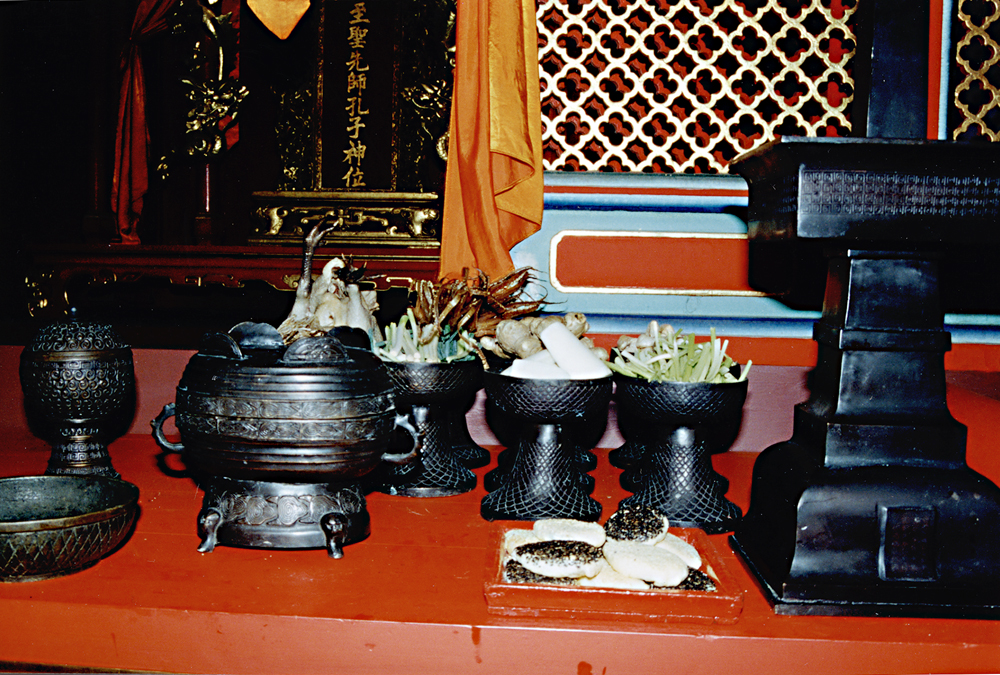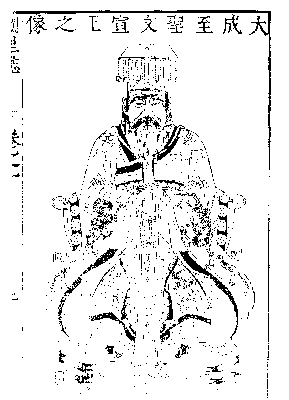
Kongzi was ultimately ennobled as king, but he held a number of titles between the time of his death and his final title, Great Completer, Ultimate Sage, Exalted First Teacher of Culture in 1645.
By posthumously ennobling Kongzi, first as duke and later as king, the imperial court promoted and endorsed Confucianism. In addition to elevating the figure of Kongzi to increasingly great statuses, emperors also conferred hereditary titles of nobility upon his descendents, initially as marquises. By Song times, however, Kongzi's descendants were given the title of duke, a position they held until the 1940s. Critical to this careful attention to the person of Kongzi as the embodiment of the literati tradition was the state cult, which centered upon offering sacrifices to Kongzi's spirit in the Kong temple.

An altar with offerings for sacrifice
The sacrifices to the spirit of Kongzi was part of a larger system of cult sacrifices to other gods and spirits. This pantheon was headed by Heaven, to which only the emperor offered sacrifices at an altar in the southern suburbs of the imperial city, followed by Earth, which received sacrifices at an altar in the northern suburbs.
An important event in the canonizing process occurred in 195 B.C., when the founding emperor of the Han dynasty, Han Gaozu (r. 206-195 B.C.), offered a Great Sacrifice to the spirit of Confucius at his tomb in Qufu. As early as 241, sacrfices to the spirits of Kongzi and his most prominent disciple, Yan Hui, were offered in the Imperial University (Biyong).
Posthumous Titles Conferred to Kongzi

A portrait of Confucius with Chinese characters
478 BCE (Jingwang 42): Duke Ai of Lu posthumously confers title of Venerable Ni
1 CE (Western Han dynasty: Emperor Ping, 1st year/6th month/10th day of the Yuanshi era): Exalted Ni Duke of Consummate Perfection (Baocheng xuan Ni gong; Ni is a reference to Mt. Ni, southeast of Qufu, where Kongzi's mother prayed for a child before he was born.)
492 (Latter Wei: Emperor Xiaowen, Taihe 16/2/21): Sage of Culture Venerable Ni (Wensheng Nifu)
580 (Latter Zhou: Emperor Jing, Daxiang 2/3/1): Duke of the state of Zou (Zouguo gong)
608 (Sui: Emperor Yang, forth year of the Daye era): First Teacher Venerable Ni (Xianshi Nifu)
628 (Tang: Emperor Taizong, Zhenguan 2/12): First Sage (Xiansheng)
637 (Tang: Emperor Taizong, Zhenguan 11): Exalted and Venerable (Xuanfu)
657 (Tang Emperor Gaozong, Xianqing 2): restored to First Sage (Xiansheng)
739 (Tang: Emperor Xuanzong, Kaiyuan 27/8/23): Exalted King of Culture (Wenxuan wang)
1008 (Song: Emperor Zhenzong, Dazhong xiangfu 1/10/1): Dark Sage and Exalted King of Culture (Xuansheng wenxuan wang)
1013 (Song: Emperor Zhenzong, Dazhong xiangfu 5/12/29): Ultimate Sage and Exalted King of Culture (Zhisheng wenxuan wang)
1307 (Yuan: Emperor Wu, Dade 11/7/18): Great Completer, Ultimate Sage and Exalted King of Culture (Dacheng zhisheng wenxuan wang)
1370 (Ming: Hongwu 3/6/6): noble titles for all gods and spirits of the imperial pantheon eliminated (e.g., 5 sacred peaks, the 4 seas); only Kongzi's (and other figures enshrined in the Kong temple) title is retained.
1530 (Jiajing emperor 9): Ultimate Sage, First Teacher Master Kong (Zhisheng xianshi Kongzi)
1645 (Qing: Shunzhi emperor, 2/1/23): Great Completer, Ultimate Sage, Exalted First Teacher of Culture (Dacheng zhisheng xianshi Kongzi)
